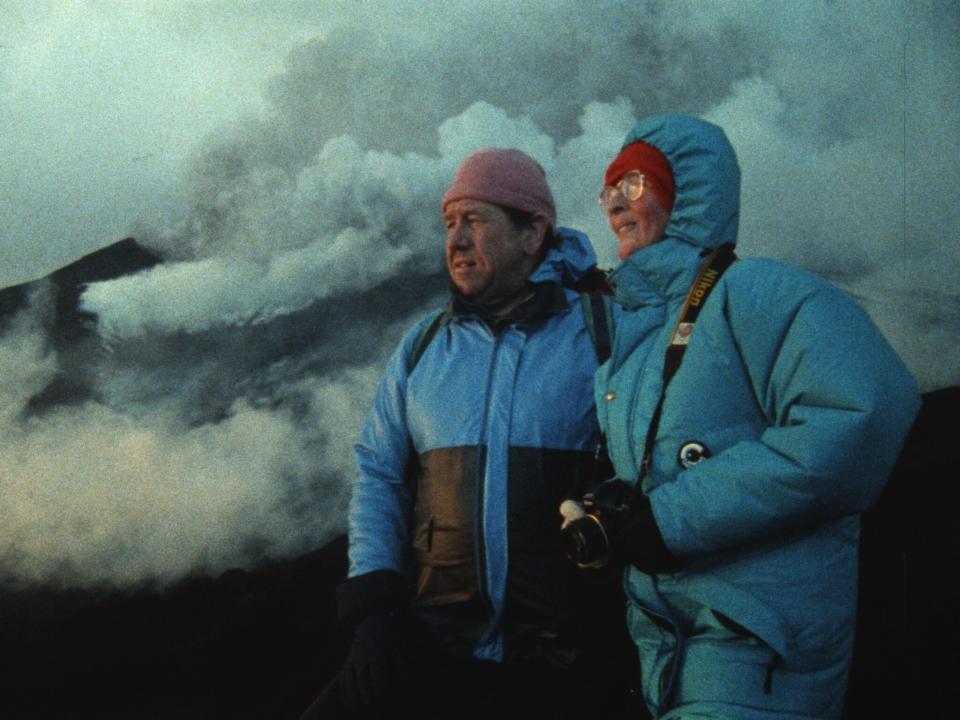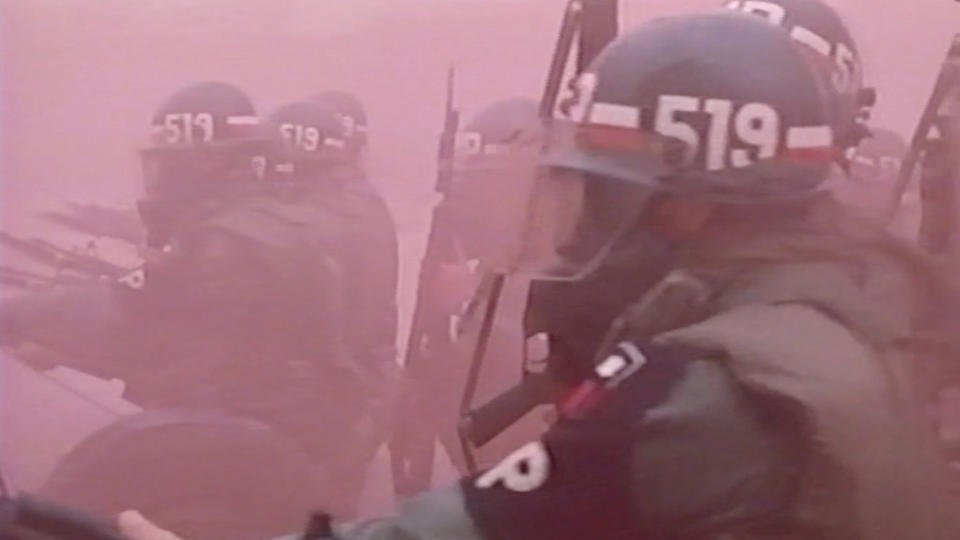Kanye West Never Signed a Release, but Netflix Didn’t Care: Inside the Gold Rush for Archival Docs

- Oops!Something went wrong.Please try again later.
The first big event movie of 2022 doesn’t feature any superheroes, though Kanye West might disagree. “Jeen-yuhs,” the sprawling three-part documentary chronicling 20 years of the rapper’s life, provides a remarkable window into his early hustle and determination as well as his hubris and mental health issues. Co-director Clarence “Coodie” Simmons, who first interviewed West in 1998, has built an astonishing portrait of his talent in motion and the fragility inherent to his mystique.
The most extraordinary thing about “Jeen-yuhs” is that it’s allowed to exist in the first place. West’s creativity may only be matched by his control over his life’s narrative. Netflix acquired the documentary for a reported $30 million last year and, starting February 16, the streaming platform will release it over the course of three weeks.
More from IndieWire
In the aftermath of the film’s virtual Sundance premiere, followed by West demanding via Instagram to “open the edit room immediately so I can be in charge of my image,” the lack of formal permission may come as a surprise. However, it’s a key part of the calculation that enabled this remarkable project to come together.
“If you think about the amount of time Kanye says on camera, ‘They’re doing a documentary about me,’ this is certainly a partnership that started over 20 years ago,” said Ian Orefice, president and COO of Time Studios, which licensed 300 hours of footage to produce the project. “They obviously had a relationship this entire time.”
The producers are banking on flexible rules for consent pertaining to people of public interest, as well as Coodie’s contention that he and West remain on good terms. Notably, West has no producing credit on “Jeen-yuhs” and did not retain final cut. In an interview from IndieWire’s virtual Sundance studio, Coodie said that West’s team had seen the end result. “I haven’t had a conversation with Kanye about it,” Coodie said. “I would hope he appreciates everything, because we’re just showing real life.”
West’s distance from “Jeen-yuhs” distinguishes it from the last three-part documentary that generated hype for its blockbuster footage: “The Beatles: Get Back,” Peter Jackson’s look behind the scenes of the seminal rock album, was made with the consent of Paul McCartney and Ringo Starr as executive producers. Disney+ acquired Jackson’s docuseries for an undisclosed sum last year.
In the growing nonfiction market, these projects speak to a gold rush for archival-based documentaries and their ability to outsource the heavy-duty work of obtaining the material that makes them unique.

Photo courtesy of Sandbox Films
Opening-night documentary selection “Fire of Love,” Sara Dosa’s immersive look at married volcanologists who died during an eruption, produced the festival’s first major bidding war and sold to National Geographic for an undisclosed seven-figure sum. The movie is almost entirely comprised of stunning color footage the couple shot over the course of their careers.
Producer Ina Finchman licensed world rights to around 200 hours of footage from the French archive Image’Est; around 65 minutes were used in the final product, which also includes media interviews. The company looked at an early sizzle reel but had no editorial input.
“It was very different from dealing with a big archive,” said Finchman. “They really took care of the footage and I had a good relationship with them. Within the context of the narrative we wanted to tell, I know we got the best footage.”
These projects offer the same appeal as NFTs: exclusivity. “The best storytelling in the doc space comes from raw footage capturing big moments,” Orefice said. “I think what you’re seeing is that you have all these people who have captivated society, and these projects are actually able to pull the curtain back and not just talk about it but show it.”
“Jeen-yuhs” began as approximately 400 hours of original footage, much of it on miniDV tapes that Coodie and co-director Chike Ozah dumped into a conference room when they first met Time Studio executives in fall 2019. Coodie owns that material, but entered a partnership with Time to co-license it to Netflix for distribution. Sundance listed the film as a work in progress and it continues to be tweaked in the edit room before its release.
Orefice declined to comment on how much footage Netflix licensed, but the project clearly exercises caution over a wide array of rights issues. Most of West’s musical compositions are only heard in a diegetic context (it’s extraordinary to watch him work through the original composition for “Jesus Walks” in a cramped New York studio), and everything we see unfolds with the context of Coodie’s first-person narration, which personalizes West’s journey.
Humanizing moments include an early sequence in which West wanders aimlessly through the halls of Roc-A-Fella Records, eager to score a recording deal with Jay-Z. It also shows him talking with doctors after the debilitating jaw injury that followed a 2002 car accident as well as a revealing conversation with his estranged father in the aftermath of his bizarre run for president in 2020. Orefice said an early rough cut ran over 14 hours.
“When you think about the best documentaries, oftentimes you’re talking about modern-day voices speaking about what happens,” he said. “Here, you’re literally seeing it.”

Archival storytelling was all over this year’s Sundance, from HBO’s Princess Diana portrait “The Princess” to Eva Longoria’s boxing documentary “La Guerra Civil.” Ramin Bahrani’s “2nd Chance” is a probing look at the militant bulletproof vest inventor Richard Davis, who recorded videos shooting himself in the chest many times over the years. Producers paid Davis a fee to obtain the footage before Bahrani even boarded the project.
For the haunting essay film “Riotsville, USA,” director and archival researcher Sierra Pettengill licensed rights to the illuminating military footage of a fake town built in the ’60s by the federal government to study control of public dissent.
“The film is constantly commenting on itself and calling attention to its sources,” Pettengill said. “We highlight ABC coverage of a promotional event for a riot control tank, for example, and point to the funding issues around Public Broadcast Laboratory, which is both a crucial part of the filmmaking and also allows for fair use claims in specific sections.”
Pettengill also pointed out the broader challenge that faces the archival documentary. “There are a lot of issues around the management and corporate control of archives,” she said. “It’s gotten especially precarious in the last two-to-three years in the streaming era. Copyright holders are also content providers and as they’ve started to recognize archives as potential cash cows, there’s been a ramping up of a shifting set of complex and byzantine rules from major archives that’s really restricting what researchers can see and use. It’s a real threat to what can be made and how.”
Others see it differently. “It’s never been a greater time to make documentarians in this space,” Orefice said. In a culture of constant replication, the heated activity around archival footage speaks to an underlying desire to see something fresh. As West himself raps in “Stronger”: “Do anybody make real shit anymore? Bow in the presence of greatness.”
Best of IndieWire
New Movies: Release Calendar for January 28, Plus Where to Watch the Latest Films
How I Shot That: The Cameras and Cinematography of Sundance Scripted Narrative Films
Sign up for Indiewire's Newsletter. For the latest news, follow us on Facebook, Twitter, and Instagram.

